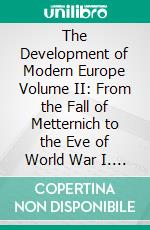James Robinson eBooks
eBooks di James Robinson di Formato Mobipocket
The Development of Modern Europe Volume II: From the Fall of Metternich to the Eve of World War I. E-book. Formato Mobipocket James Robinson - Perennial Press, 2018 -
When, in 1792, the Austrian and Prussian armies had advanced toward Paris with the object of freeing Louis XVI from the restrictions placed upon him by the National Assembly, the French, roused to fury, had deposed and executed a ruler who was convicted of plotting with foreign powers to maintain his authority. In 1814 the allies placed on the throne the brother of Louis XVI, a veteran emigre, who had openly derided the Revolution and had been intriguing with other European powers for nearly twenty years to gain the French crown. Yet there was no demonstration of anger on the part of the nation, no organized opposition to the new king. The French were still monarchical at heart and had quietly submitted to the rule of Napoleon, which was no less despotic than that of Louis XIV. There was, however, no danger that Louis XVIII would undo the great work of the Revolution and of Napoleon. He was no fanatic like his younger brother, the count of Artois. In his youth he had delighted in Voltaire and the writings of the philosophers; he had little sympathy for the Church party, and six years' residence in England had given him some notion of liberal institutions. His sixty years, his corpulence, his gout, and a saving sense of humor prevented him from undertaking any wild schemes of reaction which might be suggested to him by the emigrant nobles, who now returned to France in great numbers. Even if he had been far more inclined to absolutism than he was, he could hardly have been tempted to alter the administration which Napoleon had devised with a view of securing control of everything and everybody. The prefects and subprefects, the codes, the Church as organized under the Concordat of 1801, the Legion of Honor, the highly centralized University, even the new nobility which Napoleon had created, were all retained with little or no change...
The Development of Modern Europe Volume IFrom the Wars of Louis XIV to the Congress of Vienna. E-book. Formato Mobipocket James Robinson - Perennial Press, 2018 -
The nation which has unmistakably assumed the leading role in European affairs during the past two hundred years is France. At the opening of the eighteenth century she already enjoyed a commanding position. In the wars to which the ambition of her king, Louis XIV, gave rise, almost all the countries of western Europe took part; even their colonies in distant regions were involved, and the map of the world was fundamentally altered. A generation after Louis XIV's death France began to be recognized as the great teacher of Europe; her philosophers and economists denounced the abuses which existed everywhere and urged the reform of ancient, outworn institutions. When, in due time, France wrought a revolution in her own government, she speedily forced other nations to follow her example. Indeed, carried away by the genius of her general, Napoleon Bonaparte, she seemed at one time about to bring all Europe under her sway. Even since that arch-disturber of the peace was finally captured and sent to die on the rock of St. Helena, France has twice precipitated serious crises in European affairs, when in 1848 she proclaimed a new revolution, and in 1870 she assumed the responsibility for the last important war that has afflicted western Europe. Of the long history of France from the conquest of Gaul by Julius Cæsar to the accession of Louis XIV in 1643 little can be said here. The French kings had, from about the year 1100, begun to get the better of their vassals and had succeeded, with some setbacks, in forming a tolerably satisfactory kingdom when, about a hundred years before Louis XIV's time, the struggle between Protestants and Catholics produced new and terrible disorder which lasted for a whole generation...

